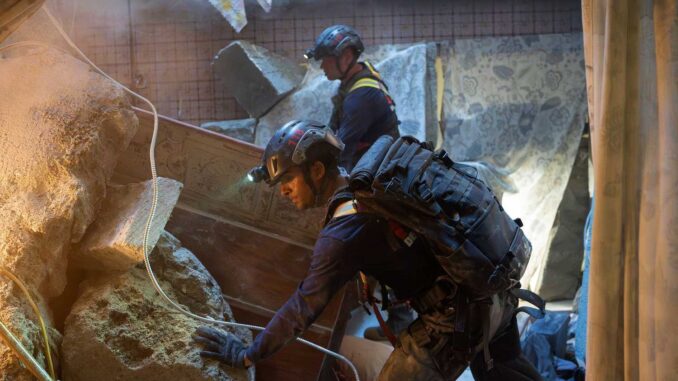
Due to Peter Krause not appearing, there was a different kind of tragedy in the 9-1-1 season 8 finale, as it turned into the true send-off for the beloved captain. To an extent, “Seismic Shifts” replaces Bobby— first with Chimney (Kenneth Choi) as the captain-elect and later with Chimney and Maddie’s (Jennifer Love Hewitt) newborn, literally named Bobby Nash Han. Due to Peter Krause not appearing, there was a different kind of tragedy in the 9-1-1 season 8 finale, as it turned into the true send-off for the beloved captain. To an extent, “Seismic Shifts” replaces Bobby— first with Chimney (Kenneth Choi) as the captain-elect and later with Chimney and Maddie’s (Jennifer Love Hewitt) newborn, literally named Bobby Nash Han.
A Hidden Tragedy Fans Didn’t See Coming
When Bobby died, we all expected grief. His funeral was raw, painful, and emotional—but Seismic Shifts delivered something entirely different: a quiet, creeping heartbreak that slipped in under the radar and hit us even harder. It’s not just about a character dying. It’s about watching people lose their emotional center—without even realizing it until it’s too late. Let’s dive deep into why this episode cut deeper than we expected—and how it left fans emotionally wrecked in ways Bobby’s death couldn’t.
Breaking Down the Pain Beneath ‘Seismic Shifts’
What Is ‘Seismic Shifts’ About, Anyway?
On the surface, Seismic Shifts was a plot-driven episode about physical and emotional earthquakes. But underneath? It was a masterclass in emotional unraveling.
While Bobby’s death was tragic, this episode was hauntingly real. It showed what happens after the flowers wilt, after the eulogies fade—when grief has fully set in.
Bobby’s Death Was Loud. Seismic Shifts Was Quiet. Too Quiet.
Bobby’s death was immediate. It shocked you. You expected the tears. But Seismic Shifts gave you that dull ache—the kind that lingers.
We weren’t prepared for the silence in this episode. The pauses. The glances. The words left unsaid. It was grief without the funeral. Mourning without the closure.
The Emotional Fallout That No One Saw Coming
In Seismic Shifts, the characters start to crack—and not because of a single death. They begin to question everything. Their purpose. Their resilience. Even their relationships.
And isn’t that the most realistic kind of heartbreak? The slow burn that doesn’t scream but simmers.
Character-by-Character Breakdown
Athena’s Silent Struggle
Athena, usually the rock, begins to falter in this episode. Her silence speaks volumes. She’s not screaming or crying—but she’s slipping. And when someone strong breaks quietly, it’s even harder to watch.
Buck’s Inner Collapse
Buck, often the emotional center of the team, wears a mask. In Seismic Shifts, that mask slips. His voice trembles. His eyes give him away. You see the cracks—and they’re devastating.
Hen’s Unspoken Grief
Hen’s coping mechanism? Keep moving. But here, she stops. She looks lost. She doesn’t even have to speak. Her stillness tells the story.
Chimney’s Guilt and Confusion
Chimney, always the comic relief, doesn’t know how to be funny anymore. And that hurts. Watching someone who always makes others smile suddenly forget how—that’s heartbreaking.
Emotional Realism vs. Tragic Drama
Real Grief Isn’t Always Loud
The genius of Seismic Shifts is that it doesn’t try to perform grief. It lets it linger. It lets characters process. You feel like you’re watching real people fall apart in real time.
No Dramatic Monologues—Just Real Moments
Unlike Bobby’s funeral, which gave us those big emotional releases, Seismic Shifts thrives on the quiet. A shared glance. A door closed too slowly. A hand gripping a steering wheel too tightly. Those are the moments that live in your gut.
The Death of Stability
Here’s the twist: Seismic Shifts doesn’t center around someone dying—it centers around everything changing. The foundation that these characters relied on? It’s gone. That’s the heartbreak: losing a world you trusted.
The Psychological Punch
Grief Is a Sneaky Monster
Unlike Bobby’s death, which gave fans permission to cry, Seismic Shifts made them question themselves. That’s far more personal. You don’t just mourn a character—you start mourning with them.
The Episode’s Symbolism Was Brutal
Every cracked wall. Every shifting floor. Every tremor—wasn’t just a plot device. It was a metaphor. Their entire emotional world was falling apart.
The Final Scene? Quiet Devastation.
That last scene. No music. No words. Just silence—and a character sitting alone. That’s what broke us. Not a death. Just a void.
Why It Resonated More Than the Funeral
We Expected to Cry at Bobby’s Funeral
And we did. We sobbed. But that emotion was given to us.
Seismic Shifts didn’t hand you a box of tissues—it made you realize too late that you needed one.
It Was Personal—Not Performative
This wasn’t about mourning a hero. It was about mourning your own stability. Watching people you love, who you think are unbreakable, start to bend in front of you? That’s pain with depth.

The Writers’ Subtle Mastery
Emotional Layering Done Right
This wasn’t a flashy episode. It didn’t go viral for a big twist. But it’s the one fans replay in their minds. That’s powerful writing. That’s what good television feels like.
Risk-Taking That Paid Off
The writers chose restraint over dramatics. They gambled on nuance—and they won. Viewers walked away unsettled. And that’s the mark of an episode that lasts.
Final Thoughts—Why It Hurt So Good
Sometimes, the Saddest Episodes Aren’t the Loudest
We came into Seismic Shifts thinking we were getting a mid-season filler. We left with our hearts in our hands.
It didn’t need explosions or last breaths. Just real humans, reacting to emotional earthquakes.
That’s why it’s secretly more heartbreaking than Bobby’s death. It didn’t ask us to cry—it made us realize we already were.